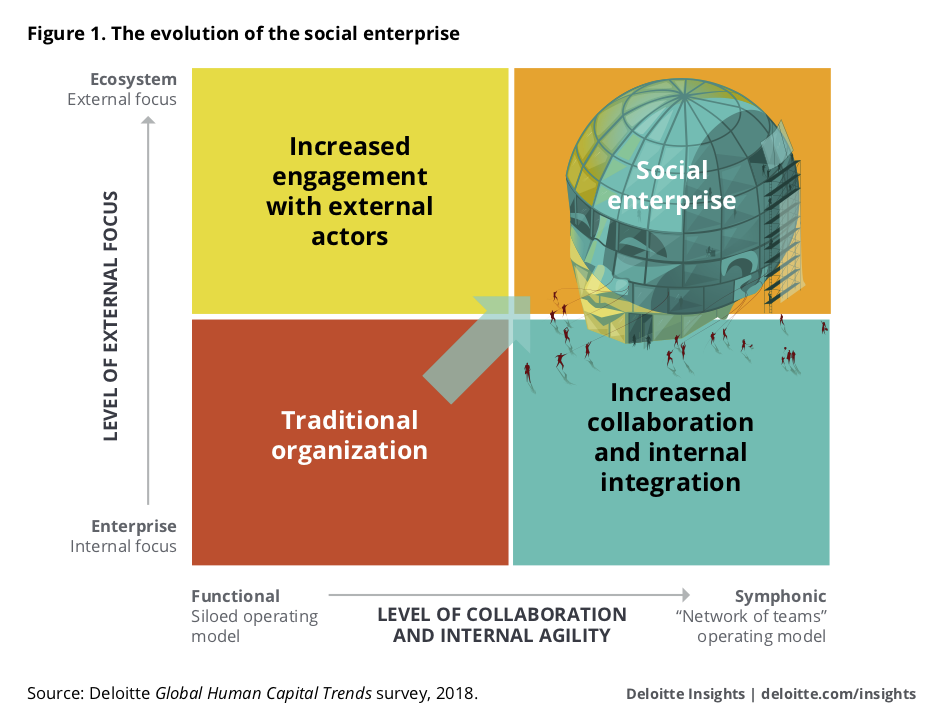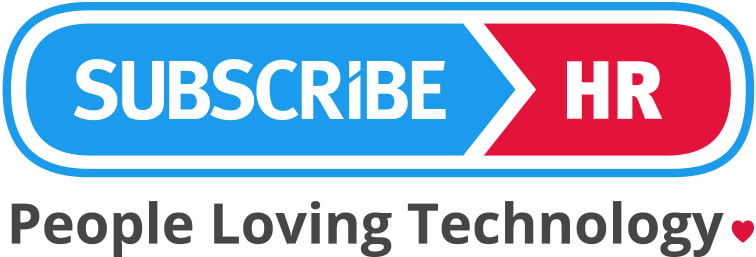There is a radical transformation taking place in the public's relationship to the organisations from whom they purchase products and services. As trust levels between the public and large institutions like Government continue to decrease, private sector businesses are being called on to fill the resulting gaps in social responsibility. In Deloitte's 2018 Global Human Capital Trends Report, they make it abundantly clear that organisations are no longer assessed solely on traditional metrics such as financial performance, or the quality of their products or services. Rather, organisations today are increasingly judged on the basis of their relationships with their workers, their customers, and their communities, as well as their impact on society at large, transforming them from business enterprises into social enterprises. Forecasts indicate that this trend will continue to grow and that business would do well to take heed, take stock, and ensure that going forward, there are strategies in place to make the transition to being a social enterprise.
The HR best practice of tomorrow will include a greater focus on building organisations that operate as holistic social enterprises. Deloitte's annual report outlines the top ten factors that business should consider when formulating strategic plans and future goals oriented towards becoming a social enterprise. As the workforce returns from the Summer break and HR looks to the year ahead, we've put together a summary of the headlines in the Deloitte report so you can contemplate (and perhaps incorporate) them throughout the coming year. We've also noticed that there has been an increase in social enterprise oriented customers we're attracting at Subscribe-HR, and we're excited about the prospect of serving these customers. To that end, we've written this HR blog to share a roadmap in the hopes that it will inspire social enterprise values and activities in your business.
The Symphonic C-Suite: Teams Leading Teams
Operating as a socially oriented enterprise and interfacing with the external environment effectively, demands an unprecedented level of cross-functional vision, connectivity, and collaboration from C- suite leaders. To implement this level of leadership, the C-Suite must behave as what Deloitte has called the “symphonic C-suite.” In practice, this symphonic approach is one in which an organisation’s top executives play together as a team while also leading their own functional teams, all in harmony. This approach both requires and enables the C-suite to understand the many impacts that external forces have on and within the organisation as a whole, (not just on single functions) and plot coordinated, agile responses.
The Workforce Ecosystem: Managing Beyond the Enterprise
Business leaders and HR Professionals recognise the need to actively and strategically manage relationships with a wide range of stakeholders beyond the borders of the enterprise, which increasingly affect how an organisation delivers services and interacts with customers. When survey respondents were asked to forecast the makeup of their workforce in 2020, 37 percent of survey respondents expected a rise in contractors, 33 percent foresaw an increase in freelancers, and 28 percent expected growth in gig workers. Across the board, businesses are finding ways to align their culture and management practices with these external talent segments—engaging the workforce ecosystem for mutual benefit.
New Rewards: Personalised, Agile and Holistic
Now more capable of (and confident to) leverage their power as individuals, Employees are asking for more personalised, agile, and holistic rewards from their Employers, including a focus on fair and open pay. While businesses tend to recognise this shift in expectation, only 8 percent of respondents report that their rewards program is “very effective” at creating a personalised, flexible solution. Early experiments in this context are exploring how to develop a holistic variety of rewards and match them to individual preferences, across diverse talent segments and on a continuous basis.
From Careers to Experiences: New Pathways
The career of the 21st century places the individual and his or her experiences centre stage. Instead of a steady progression along a linear pathway, leading organisations are shifting toward a model that empowers individuals to acquire valuable experiences, explore new roles, and continually reinvent themselves. However, 59 percent of survey respondents rated their organisations as "not effective" or only "somewhat effective" at empowering people to manage their own careers. Improvement across this area will be essential to attract top talent, especially as technology continues to transform the skills landscape.
The Longevity Dividend: Work in an Era of 100-Year Lives
Visionary organisations see extended longevity and population ageing as an opportunity. Twenty percent of this year’s survey respondents said that they are partnering with older workers to develop new career models. According to Deloitte, this longevity dividend enables companies to both address a pressing societal issue and tap into a proven, committed, and diverse set of workers with well developed skills and experience. However, managing this requires innovative practices and policies to support extended careers, as well as collaboration between business leaders and workers, to tackle shared challenges such as age bias and pension shortfalls.

Citizenship and Social Impact: Society Holds the Mirror
The track record of an organisation's corporate citizenship and social impact now has a direct bearing on its core identity and strategy. Engagement with other stakeholders on topics such as diversity, gender pay equity, income inequality, immigration, and climate change can lift financial performance and brand value, while failure to engage can destroy reputation and alienate key audiences. Many organisations are still catching up: 77 percent of survey respondents said that corporate citizenship is important, but only 18 percent say this issue is a top priority reflected in corporate strategy.
Well-being: A Strategy and a Responsibility
As the line between work and life blurs further, Employees are demanding that organisations expand their benefits offerings to include a wide range of programs for physical, mental, financial, and spiritual health. In response, employers are investing in well-being programs as both a societal responsibility and a talent strategy. More than 50 percent of survey respondents view a variety of such programs as “valuable” or “highly valuable” to employees, but big gaps still remain between what employees value and what companies are delivering.
AI, Robotics, and Automation: Put Humans in the Loop
The influx of AI, robotics, and automation into the workplace has dramatically accelerated in the last year, transforming in-demand roles and skills both inside and outside organisations. The greatest opportunity doesn't just lie with the redesign of jobs or automation of routine work, but instead in fundamentally re-thinking “work architecture” to provide holistic benefit to organisations, teams, and individuals.
The Hyper-Connected Workplace: Will Productivity Reign?
New communications tools are rapidly entering the workplace. Seventy percent of respondents believe workers will spend more time on collaboration platforms in the future. 67 percent see growth in “work-based social media,” and 62 percent predict an increase in instant messaging. Like the outside world, organisations are becoming hyper-connected; but the critical factor is whether they can translate that hyper-connectivity into actual productivity.
People Data: How Far is Too Far?
The rapid increase in data availability and the advent of powerful people analytics tools have generated rich opportunities for HR and organisations. However, they also have the potential to generate a variety of potential risks. Organisations face a tipping point: Develop a set of well-defined policies, security safeguards, transparency measures, and ongoing communication around the use of people data, or risk employee, customer, and societal backlash.
A Wake Up Call for Business
Deloitte's 2018 Global Human Capital Trends report, as well as the information disclosed by investigations like the Financial ServicesRoyal Commission, sound a very loud and abundantly clear wake-up call for organisations. Facilitating the rise of the social enterprise will necessitate a determined focus on building social capital.
Deloitte's report outlines that this can be achieved by:
-
Engaging with diverse stakeholders,
-
Accounting for external trends,
-
Creating a sense of mission and purpose throughout the organisation, and
-
Devising strategies that manage new societal expectations.
Based on their research and the feedback submitted by survey participants, there is A LOT at stake. Given the shift of perception and expectations within the community, every organisation’s reputation, relationships, and, ultimately, success or failure is inherently connected to the quantum of social orientation in its operations. In this new era, human capital is inextricably tied to social capital. This reality demands a fundamental pivot in how organisations do business today—and how they prepare for the human capital challenges of the future.
Subscribe-HR is proud to support a growing number NFPs and socially oriented enterprises. We offer special pricing to the not-for-profit sector upon request, as well as ensuring that our elastic pricing model meets the needs and can be structured to mirror the cashflow of businesses in the social enterprise, B Corp and purpose or values driven sectors.
Do you have the systems and processes in place to transform and sustain your business? If not, you can start your digital transformation right here! To make things easy for you, we will even digitise some of your forms for FREE. In fact, we're so committed to improving the user experience of both HR Professionals AND the employees they serve, we offer FREE access to our Employee Onboarding Software solution, plus, we will set up five Letters of Offer and five Employment Contracts for FREE.
Sounds too good to be true? Well it isn't. If you would like to discover more about how to automate your Employee Onboarding process and digitise the forms you need to use as part of that process, simply click on the button below.


